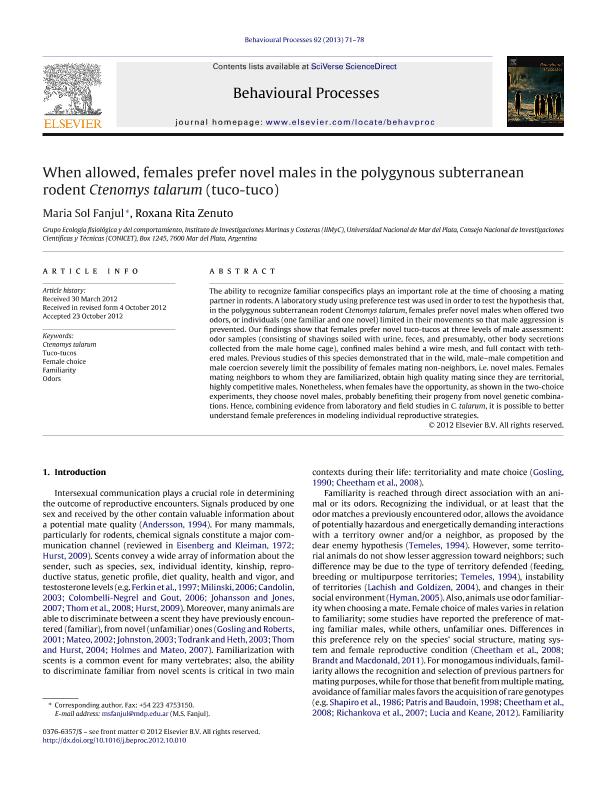Artículo
When allowed, females prefer novel males in the polygynous subterranean rodent Ctenomys talarum (tuco-tuco)
Fecha de publicación:
01/2013
Editorial:
Elsevier Science
Revista:
Behavioural Processes
ISSN:
0376-6357
Idioma:
Inglés
Tipo de recurso:
Artículo publicado
Clasificación temática:
Resumen
The ability to recognize familiar conspecifics plays an important role at the time of choosing a mating partner in rodents. A laboratory study using preference test was used in order to test the hypothesis that, in the polygynous subterranean rodent Ctenomys talarum, females prefer novel males when offered two odors, or individuals (one familiar and one novel) limited in their movements so that male aggression is prevented. Our findings show that females prefer novel tuco-tucos at three levels of male assessment: odor samples (consisting of shavings soiled with urine, feces, and presumably, other body secretions collected from the male home cage), confined males behind a wire mesh, and full contact with tethered males. Previous studies of this species demonstrated that in the wild, male–male competition and male coercion severely limit the possibility of females mating non-neighbors, i.e. novel males. Females mating neighbors to whom they are familiarized, obtain high quality mating since they are territorial, highly competitive males. Nonetheless, when females have the opportunity, as shown in the two-choice experiments, they choose novel males, probably benefiting their progeny from novel genetic combinations. Hence, combining evidence from laboratory and field studies in C. talarum, it is possible to better understand female preferences in modeling individual reproductive strategies
Palabras clave:
Ctenomys Talarum
,
Tuco-Tucos
,
Female Choice
,
Familiarity
,
Odors
Archivos asociados
Licencia
Identificadores
Colecciones
Articulos(IIMYC)
Articulos de INSTITUTO DE INVESTIGACIONES MARINAS Y COSTERAS
Articulos de INSTITUTO DE INVESTIGACIONES MARINAS Y COSTERAS
Citación
Fanjul, Maria Sol; Zenuto, Roxana Rita; When allowed, females prefer novel males in the polygynous subterranean rodent Ctenomys talarum (tuco-tuco); Elsevier Science; Behavioural Processes; 92; 1-2013; 71-78
Compartir
Altmétricas




